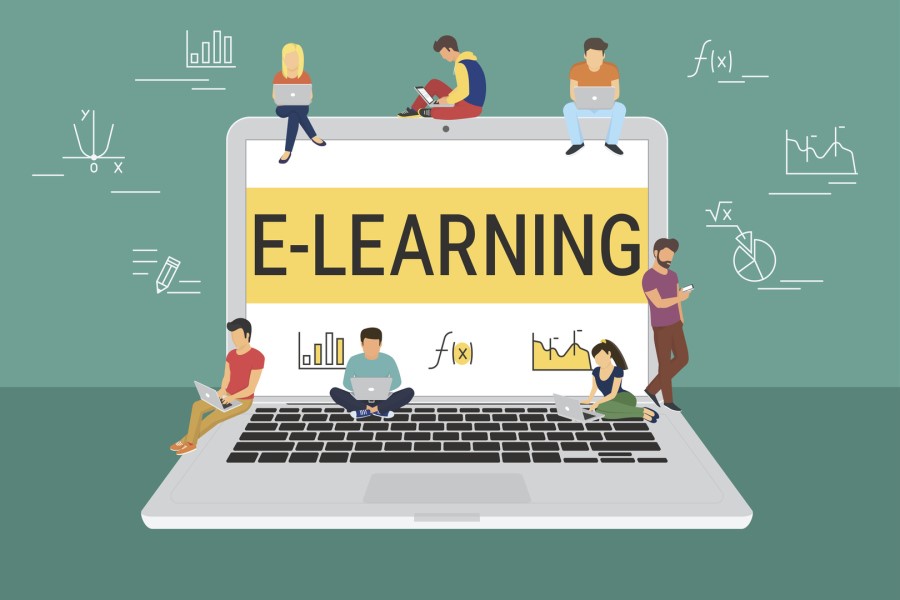
As we look ahead, e-learning and the future of education are closely connected. The shift towards hybrid models and personalized learning paths is reshaping traditional systems. Whether you are a student, educator, or business professional, understanding this evolution is essential for success in today’s learning environment.
The Rise of E-Learning: Trends and Market Growth
E-learning platforms have grown rapidly in recent years, driven by advances in technology and increasing demand for flexible education. The global e-learning market is expected to reach over $460 billion by 2026. This growth is fueled by a combination of accessible digital tools and the rise of remote learning, which became even more important during the COVID-19 pandemic.
One key driver of this expansion is the need for more flexible learning environments. Students and professionals seek education options that fit into their busy schedules. E-learning offers convenience and accessibility, allowing learners to study at their own pace from any location. Additionally, technological innovations like AI and data analytics have made it easier to personalize the learning experience.
As you consider e-learning and the future of education, it’s clear that these platforms will continue to play a significant role. They provide cost-effective solutions for both institutions and learners, making quality education more widely available. In the coming years, this trend will only accelerate as more organizations adopt digital learning as a core part of their strategy.
Technological Innovations Shaping E-Learning
Technological innovations are transforming e-learning, making it more engaging and effective. Artificial intelligence (AI) is driving significant changes in how learners interact with content. AI-powered systems can analyze learning behaviors, providing personalized recommendations and support. This allows students to focus on areas where they need improvement, enhancing the overall learning experience.
Virtual reality (VR) and augmented reality (AR) are also gaining traction in e-learning. These technologies create immersive environments where learners can engage with concepts in new, interactive ways. For example, VR can simulate real-world scenarios, allowing students to apply knowledge in practical settings. Meanwhile, AR overlays digital information on real-world objects, enhancing understanding.
Mobile learning and cloud-based platforms further expand access to education. Learners can access content on-the-go, using smartphones or tablets. Cloud technology ensures that learning materials are available anytime, reducing barriers related to physical location. As mobile devices become more widespread, this trend will continue to grow.
Personalized learning paths are also becoming more common, thanks to data analytics. These systems track a learner’s progress and recommend tailored content based on their needs. This makes e-learning more flexible and adaptive. As a result, e-learning and the future of education are becoming more aligned with the demands of modern learners and organizations.
The Benefits of E-Learning for Students and Institutions
E-learning offers significant benefits for both students and institutions. One of its key advantages is flexibility. Students can learn at their own pace, fitting their studies around other commitments. This flexibility appeals to learners balancing work, family, or other responsibilities. Additionally, e-learning is accessible from anywhere with an internet connection, making education available to a wider audience.
Cost-effectiveness is another major benefit. Online programs often require fewer resources, reducing costs for both students and institutions. Without the need for physical classrooms, institutions can reach more learners while maintaining lower overhead expenses. This makes e-learning a practical solution for both small and large educational organizations.
E-learning also breaks down geographical barriers, providing access to education across the globe. Students no longer need to relocate or travel to attend courses. This global reach allows institutions to attract a diverse range of learners, enhancing cultural exchange and broadening perspectives.
Virtual classrooms create opportunities for collaboration and engagement. Students can interact with peers and instructors in real time, sharing ideas and participating in discussions. These platforms often include features like group chats, forums, and breakout rooms, fostering active learning. E-learning and the future of education are deeply intertwined, as more institutions embrace these innovative tools to create a more inclusive, accessible learning experience for all.
Challenges and Limitations of E-Learning
E-learning presents many benefits, but it also faces challenges. One significant issue is the digital divide. Not all students have access to reliable technology or high-speed internet. This gap creates an unequal learning experience, particularly for those in rural or low-income areas. Without access to these tools, learners may struggle to keep up with their peers.
Another challenge is maintaining student motivation and engagement. Online learning requires a high level of self-discipline, and some students find it hard to stay focused. Without the structure of a traditional classroom, learners can easily lose interest. Additionally, it can be difficult for instructors to monitor participation and encourage active involvement in virtual settings.
Quality assurance is also a concern in e-learning. Not all online courses maintain the same level of rigor as traditional programs. There are still questions around the value of online credentials in some industries. Institutions need to ensure their e-learning programs meet high educational standards and are recognized by employers. As you consider e-learning and the future of education, it’s clear that addressing these challenges is essential for long-term success.
The Role of E-Learning in Corporate Training and Workforce Development
E-learning plays a significant role in corporate training and workforce development. Many businesses use online learning platforms to upskill their employees, providing flexible training that fits into their busy schedules. E-learning allows companies to offer consistent, scalable training across global offices. This helps employees stay updated on industry trends and sharpen their skills.
Incorporating features like microlearning and gamification has made corporate e-learning more engaging. Microlearning delivers content in short, focused bursts, which helps employees absorb information more effectively. Gamification, on the other hand, uses interactive elements to boost engagement and make learning more enjoyable. Additionally, many companies offer certifications through e-learning platforms, which not only motivate employees but also provide tangible credentials.
The benefits of e-learning for employee retention and performance are clear. Continuous professional development opportunities make employees feel valued and empowered. When workers see chances for growth, they are more likely to stay with a company. Moreover, well-trained employees tend to perform better, contributing to overall organizational success. E-learning and the future of education are clearly intertwined, as more businesses recognize its value in shaping a skilled, adaptable workforce.
The Future of Education: Hybrid Models and Lifelong Learning
Hybrid learning environments are becoming a central part of modern education. By combining in-person and online elements, hybrid models offer flexibility while retaining the benefits of face-to-face interaction. This approach allows students to engage with course materials at their own pace, while still participating in live discussions. As technology improves, hybrid learning will likely become the norm across many educational institutions.
In today’s rapidly changing world, lifelong learning is more important than ever. Jobs and industries are evolving, and workers need to continuously update their skills to remain competitive. E-learning makes this possible by providing accessible, flexible learning options that fit into busy schedules. More people are turning to online courses for career development, signaling a shift towards learning as a lifelong process.
As e-learning and the future of education become increasingly linked, traditional education systems will continue to evolve. Online education will not replace classrooms, but it will reshape how institutions deliver learning. Schools and universities will likely adopt more hybrid models, making education accessible to a broader audience. In this way, the future of education will be defined by a blend of digital and traditional methods that support continuous growth and learning.
Conclusion
E-learning has become a driving force in shaping education today and will continue to influence its future. As technology advances, you will see even more integration of online platforms into both traditional and corporate learning environments. The flexibility, accessibility, and cost-effectiveness of e-learning make it an essential tool for students, professionals, and institutions alike.
While challenges like the digital divide and maintaining engagement remain, solutions are emerging. Hybrid models and personalized learning paths will play a key role as the demand for continuous, lifelong learning grows. E-learning and the future of education are intertwined, and their evolution will redefine how we approach learning for years to come.


